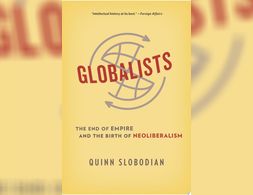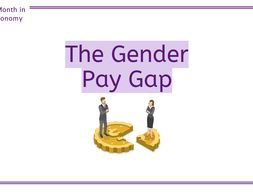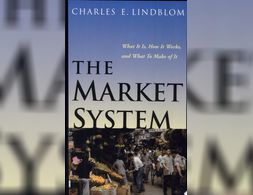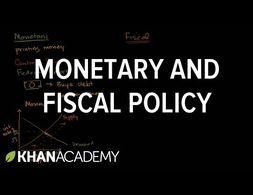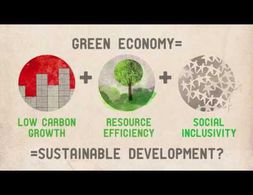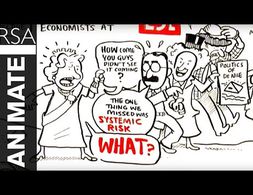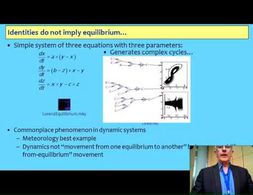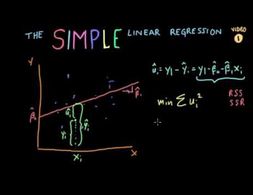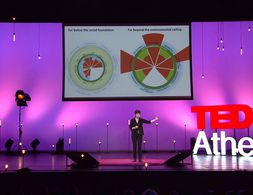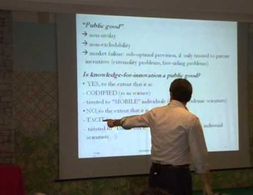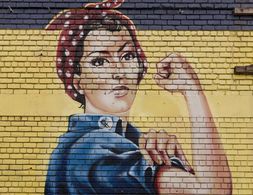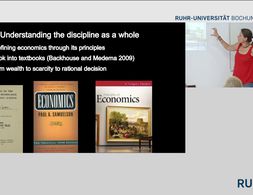✕
1136 results
In the first intellectual history of neoliberal globalism, Quinn Slobodian follows neoliberal thinkers from the Habsburg Empire’s fall to the creation of the World Trade Organization to show that neoliberalism emerged less to shrink government and abolish regulations than to deploy them globally to protect capitalism.
This book discloses the economic foundations of European fiscal and monetary policies by introducing readers to an array of alternative approaches in economics. It presents various heterodox theories put forward by classical economists, Marx, Sraffa and Keynes, as a coherent challenge to neoclassical theory.
Potts (economics, University of Queensland) proposes evolutionary microeconomics as a synthesis of the collective schools of heterodox economic thought with complex systems theory and graph theory.
This unique up-to-date volume not only provides state-of-the-art discussions of the most recent developments in modern macroeconomics but also includes a series of interviews with leading economists that shed new light on the major intellectual and policy issues of the 1990s. The book is at once an invaluable text and a superb overview that will be welcomed by teachers and students alike.
So, what does racism have to do with our 21st century economic system? How can we understand institutions who uphold racism while claiming to value diversity and inclusion? And what does it mean to truly be anti-racist?
In Colonial Debts Rocío Zambrana develops the concept of neoliberal coloniality in light of Puerto Rico's debt crisis. Drawing on decolonial thought and praxis, Zambrana shows how debt functions as an apparatus of predation that transforms how neoliberalism operates.
The Routledge Handbook of Feminist Economics presents a comprehensive overview of the contributions of feminist economics to the discipline of economics and beyond. Each chapter situates the topic within the history of the field, reflects upon current debates, and looks forward to identify cutting-edge research. Consistent with feminist economics' goal of strong objectivity, this Handbook compiles contributions from different traditions in feminist economics (including but not limited to Marxian political economy, institutionalist economics, ecological economics and neoclassical economics) and from different disciplines (such as economics, philosophy and political science). The Handbook delineates the social provisioning methodology and highlights its insights for the development of feminist economics. The contributors are a diverse mix of established and rising scholars of feminist economics from around the globe who skilfully frame the current state and future direction of feminist economic scholarship. This carefully crafted volume will be an essential resource for researchers and instructors of feminist economics.
The gender pay gap is a pressing issue that affects individuals and society as a whole, so it is important for economics students to understand it. Despite recent progress, women still earn less than men for the same jobs, leading to economic inequalities and reduced efficiency (see, for example, the recent report released by Moody’s). Understanding the causes and consequences of the gender pay gap is critical in developing policies that promote fairness and equality.
Ride hailing home sharing meal delivery and other forms of digitally powered task sharing are creating jobs and growth in Europe and significant policy challenges What should be the responsibilities of these new platforms how should workers be classified and how can insurers and others provide services to this new …
Adam Smith's The Wealth of Nations provided the first, most influential and lasting explanation of the workings of modern economics. But with his focus on "the market" as the best mechanism for producing and distributing the necessities of life, Smith's concepts only told part of the story, leading to flawed economic models that devalue activities that fall outside of the market's parameters of buying and selling.
Economists like to base their theories on individual decision making. Individuals, the idea goes, have their own interests and preferences, and if we don’t include these in our theory we can’t be sure how people will react to changes in their economic circumstances and policy. While there may be social influences, in an important sense the buck stops with individuals. Understanding how individuals process information to come to decisions about their health, wealth and happiness is crucial. You can count me as someone who thinks that on the whole, this is quite a sensible view.
In order to address discrimination, we must understand and address its fundamental basis of systemic oppression. Stratification economics goes beyond myopic mainstream conceptualisations of discrimination and recognises the historical, institutional, and structural factors that create and maintain socioeconomic disparities and hierarchies. To critically approach the economics of discrimination, this workshop will focus on stratification economics, a systematic and empirically grounded approach to addressing intergroup inequality (Darity, 2005). Focusing on racial discrimination, we will discuss the core elements of stratification economics, critically evaluate its relevance, and apply these understandings to construct case studies and solutions for change. In our discussions, we will consider an array of topics, including intersecting oppressions, reparative justice, and the role of knowledge production in overcoming injustice and creating a better world.
In this clear and accessible book, an eminent political scientist offers a jargon-free introduction to the market system for all readers, with or without a background in economics
From the mercantile monopolies of seventeenth-century empires to the modern-day authority of the WTO, IMF, and World Bank, the nations of the world have struggled to effectively harness globalization's promise. The economic narratives that underpinned these eras the gold standard, the Bretton Woods regime, the "Washington Consensus" brought great success and great failure.
This video by the Khan Academy presents the difference between monetary policy and fiscal policy and how they affect aggregate demand. The video especially elaborates on the basic explanation on how expansionary monetary policy increases aggregate demand via the market for money and the AD-AS model.
What is sustainable development and what is the idea of a green economy? What is the role of the green economy in the current triple crisis? The short video discusses the concept and in particular the concerns about a green economy, especially with regards to inequality and poverty. The short statements in the video also reflect other possibilities of transformation.
David Harvey illustrates the five most common narratives on why the financial and economic crisis took place – from human frailty to policy failure.
Steve Keen discusses DSGE modeling and microfoundations by asking the question if it is ideologically possible to derive macroeconomics from microeconomics.
First some terminology is explained. Then the interpretations of the coefficients and constants of the function are discussed. Afterwards the zero conditional mean assumption regarding the residual is problematized. Lastly, a graphical representation of a regression line is given and the least sum of squared errors is introduced and the equation for the coefficient of the linear function as well as for the intercept is given.
In this radio interview, Andrew Sayer first outlines some features of neoliberalism and policies that are associated with it. Then a difference between wealth creation via investment and wealth extraction by means of lending money to those deprived of it or by acquiring property such as real estate or financial assets on the secondary market as absentee owner is established. In this context reference is made to J.A. Hobson's concept of "improperty." Finally, there are some words on the power dynamics associated with capitalism and its relation to climate change.
In this lecture Ben Fine aims at stimulating interest for and explaining the relevance of Marxist Political Economy. Ben Fine dedicates the first half of his comprehensible lecture to the question on how mainstream economics became the way it is by explaining its key concepts and how those evolved during the past 150 years. While critically reflecting those concept he also emphasizes that mainstream economics does not consider historical processes. This is the point of departure on his presentation of the core terms and crucial categories of Marxist Political Economy: e.g. the production process and class relations (Part 1). Part 2 examines the consequences of the capitalist mode of production and its propensity to crises. Ben Fine illustrates this Marxist analysis with the example of the current crisis and explains current conditions for the accumulation of capital.
In this lecture Ben Fine aims at stimulating interest for and explaining the relevance of Marxist Political Economy. Ben Fine dedicates the first half of his comprehensible lecture to the question on how mainstream economics became the way it is by explaining its key concepts and how those evolved during the past 150 years. While critically reflecting those concept he also emphasizes that mainstream economics does not consider historical processes. This is the point of departure on his presentation of the core terms and crucial categories of Marxist Political Economy: e.g. the production process and class relations (Part 1). Part 2 examines the consequences of the capitalist mode of production and its propensity to crises. Ben Fine illustrates this Marxist analysis with the example of the current crisis and explains current conditions for the accumulation of capital.
In this radio interview, Philip Mirowski, author of the book "Never Let a Serious Crisis Go to Waste" presents several differences between neoclassical economics and neoliberalism. Apart from a historical outline, Mirowski primarily discusses different perceptions of markets and the role of the state. Mirowski further reflects on the role think tanks ("part of the "neoliberal thought collective") and the entrepreneurial self (the "neoliberal agent") in the spreading and fostering of the neoliberalism.
Even if men were perceived as the main protagonists of the Greek crisis, the crisis had a deep impact on disadvantaged groups, in particular migrant women working as domestic labourers. The debate presents the particular impact on migrant women of the downturn and furthermore discusses how migrant struggles and other emancipatory movements impacted the politics of crisis. The first minutes of the video are in German, but the moderator switches to English.
What does political economy say about the global sugar production? Take a look at global trade regulations, intercountry inequalities, and the role of marketing.
Maria Nikolaidi on how Minsky’s theory has been modelled over past decades and how one can use these models in order to analyse contemporary issues such as financial fragility and financial instability caused by climate change.
This historic timeline presents economic events, economic thinkers and schools of thought from the 18th century until the 2007/2008 financial and economic crisis with short texts on the respective event or perspective.
This talk was given at a local TEDx event, produced independently of the TED Conferences. Economic theory is centuries out of date and that's a disaster for ...
The Lecturer Prof. Francesco Lissoni presents basic concepts of the Economics of Innovation. Firstly, he distinguishes between invention, innovation and diffusion and relates innovation to economic growth. Subsequently, he elucidates learning and network effects.
The lectures were given by Steve Keen at the Exploring Economics Summer Academy 2017 in the workshop on Post Keynesian Economics The first lectures start with the role of money in a monetary economy and explain the macroeconomic significance of admitting the reality that banks create money The lectures continue …
This text provides an overview of feminist perspectives on various kinds of work and reproductive labour. The authors start at the intersection of Marxism and Feminism. They, then, give a historical background on the United States feminist movement. They, finally, provide alternative perspectives on work and reproductive labor that are not based on Marxist Feminist theory.
In this lecture, Beatrice Cherrier explains why it is worth to research the history of JEL codes. The changing relationship between theory and application and the rise and death of new economic topics in the XXth century through the successive revisions of the classification system economists use to publish, recruit and navigate their discipline.
We use cookies on our website. Click on Accept to help us to make Exploring Economics constantly better!

